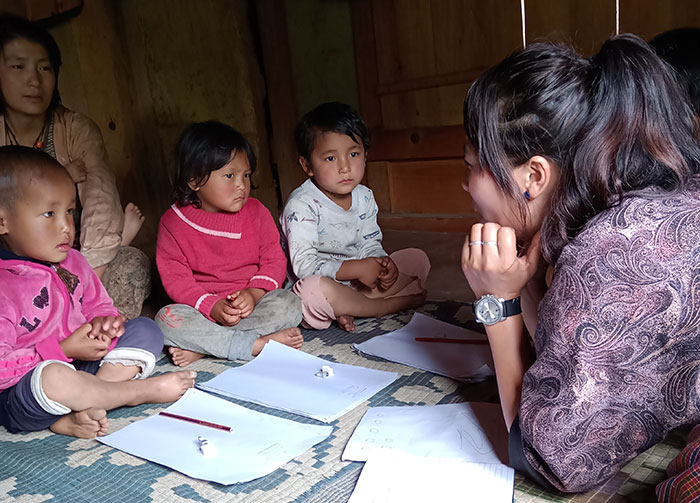… there is much more to do
Yangchen C Rinzin
Bhutan has achieved primary school enrolment by 8-year-old, access to Early Childhood Care and Development (ECCD), however, has remained limited for younger children impacting their school readiness.
Age, hard to reach groups, family income and special needs is some of the key challenges for access and equity, according to a UNICEF report on ‘An Evaluation of the ECCD programme in Bhutan’.
The report launched yesterday recommends access for all children to quality and equitable ECCD services, as the empirical evidence has shown that it has a positive effect on the child’s outcome.
Enrolment in the ECCD was found low in nomadic and remote settlements, rural and growing number of poor children in urban areas where most ECCD centres are private and not affordable.
This was also prevalent where many education stakeholders shared the need for additional ECCD centres particularly in remote areas while those with centres indicated a need to upgrade.
“Equity in services offered intersects with access challenges. Children from wealthier families’ have access to private ECCD provision and have better educational and health outcomes,” the report stated.
With many agencies establishing creches that are mostly funded by parents, it was noticed that some children have transitioned directly from creches to school affecting children’s readiness to join school.
Three fourth of the primary teachers interviewed said that those children who went to an ECCD were ready for school compared to those who didn’t attend ECCDs.
The report is the first comprehensive national evaluation of ECCD that has focused on ECCD services in the country through multi-sectoral lenses. It also assessed the relevance, effectiveness, efficiency, and sustainability of the provision of existing ECCD services in Bhutan.
It also recommended that all children should have the opportunity to access fee-free ECCD. For instance, community-based ECCD centres should ensure free services for children from vulnerable backgrounds.
Children with disabilities also have limited access to ECCD and have been missing out early intervention like lack of therapeutic services and facilitators with specialised training, and compounds the risk of this vulnerable group.
The report pointed out that there is a need to develop a referral-and-reply system for the early identification and provision to support children with special needs.
The evaluation was based on samples from nine dzongkhags from east, central, west with survey responses collected from about 1,036 respondents, 584 children and 54 interviews.
Although there is evidence that there are many children with disabilities, many service providers lacked the necessary knowledge and experience to provide services to these children.
“Only four health workers from total interviewees reported on providing care to children with disabilities.”
Bhutan targets to increase ECCD enrolment rate to 50 percent by 2024 and 100 percent by 2030. To achieve such a target, the report recommended that the government must increase the establishment of the centre-based programme and mobile ECCD facilitator programmes and other alternatives.
Poor centre infrastructure and staff qualification are some of the major challenges. Facilitators today have to pass Grade 12 and attend only 13 days training.
The report recommended raising the minimum qualification for ECCD professionals including crèche caregivers. Interviewees also indicated they want opportunities for targeted professional development.
While the Royal Civil Service Commission approved an increase in salary from Nu 11,400 to Nu 16,000 in July 2019, salaries still remain low. A case study of investment in ECCD indicated that about Nu 47 million was spent between 2001 and 2016 with an average operational cost of Nu 8,300 per year per child.
However, the evaluation showed that conditions at many centres do not cover the cost of establishing a safe and stimulating ECCD environment like sufficient human, materials and financial resources. Many interviewees said that budget was insufficient to cover daily operation.
The report recommended a need for multi-sectoral coordination and implement a whole-system approach to ECCD. The stakeholders lacked a common understanding of ECCD and its definition.
Education Minister JB Rai said the findings of the report and experiences from the facilitators would give the ministry and its partners, a solid foundation to look forward and achieve the targets set by the government.
“The findings call for collaborative effort for effective ECCD programming at different levels. This would address quality issues, which is one of the findings of the study and the professionalisation of ECCD programmes,” he said.
UNICEF Representative Dr Will Parks said while some countries are considering opening ECCD later others are considering to open early and prolonged lack of access to pre-school is likely to have a high impact on children’s brain development.
“Given the role ECCD serves to support parents and caregivers return to work, the relaxation of lockdown means that families need care options, as they return to work,” he said.
The education ministry has proposed to reopen both public and private ECCD centres after it was closed due to Covid-19 pandemic. It is waiting for a response from the Cabinet.
“We need government’s direction and we are ready to reopen anytime,” an education official said.
ECCD closes in November end during normal times. There are 379 public and private ECCD centres with 9,488 students and 903 facilitators.


